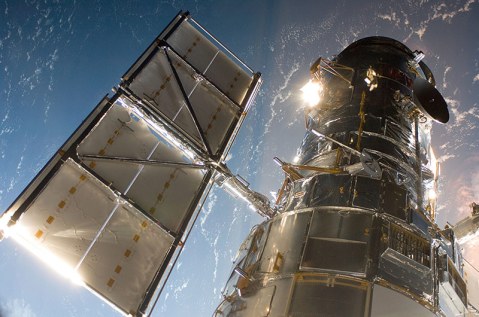Galaxy Zoo: Hubble
The Galaxy Zoo project has evolved once again – now we are classifying galaxies from the incredible Hubble Space Telescope! Galaxy Zoo: Hubble is the new incarnation of the Galaxy Zoo project and it continues to allow you to help astronomers with real scientific research by asking you to to visually classify galaxies online.
The original Galaxy Zoo and Galaxy Zoo 2 both used data from the Sloan Digital Sky Survey and recently, after reaching 60,000,000 classifications those projects began to wind down. The timing is excellent though and it allows Galaxy Zoo: Hubble to launch today, for the 20th anniversary of the space telescope. Images of galaxies taken using the legendary space telescope are there for everyone to classify and I recommend that you go and do just that.
A lot of the fainter galaxies look like those seen in the Sloan catalogue from Galaxy Zoo 2 (this is a good sign, since we don’t want galaxies to change wildly depending on what telescopes we use!) however in amongst these there are some real gems to be discovered in the Galaxy zoo: Hubble data. I just found a couple in my first tentative classifications, I’ve shown them here to whet your appetites.
Hubble has now been in orbit for 20 years. In that time it has helped us to understand the age of the Universe, to see more distant galaxies than ever before, to detect the presence of black holes in the centre of galaxies, to witness a comet collide with Jupiter, and much more!
Hubble has captured the imagination of people all around the world and it has given us some of the most iconic images of space that exists in the public consciousness. The image at the top of this post was taken during Servicing Mission 4, just after the Space Shuttle Atlantis captured Hubble with its robotic arm in May 2009, beginning the mission to upgrade and repair the telescope. Thanks to that upgrade, Hubble will continue to provide amazing images and science for many years.
So that’s enough chat from me – go and classify some Hubble galaxies!
13 responses to “Galaxy Zoo: Hubble”
Trackbacks / Pingbacks
- - May 2, 2010
- - March 27, 2015



I was surprised today when I selected ‘features’ and was asked about clumps. The addition of ‘Hubble’ brings some interesting values to the equation of classification.
I Zoo, do you?
Lots of clumpy blue galaxies, very interesting.
Thank you, Robert for this exciting announcement. We Zooites will certainly do our traditional best with GALAXY ZOO : HUBBLE.as we did with GZ & GZ2.
JKHC.
Hi – This is the only Galaxy Zoo related place I can post!
I want to participate in GZ with the new hubble images, but I cannot register (the link on the main page is broken.)
Am I the only one with this problem?
Galaxy Zoo is awesome!
There are a lot of weird sights out three, clumps, filaments and a lot more. We probably need some more cklassifications tools (aka “buttons”) to help classify what we see a bit better.
Since much of it is far away – and hence early – it looks like there are a lot of things that look like irregulars, for example, but which aren’t clumpy etc etc. Could someone give some thought to that?
Having done a modest sample we also need the equivalent of the Irregulars Project’s “this is too faint/blurred/indistinct for me to make out what I am seeing” button which is different from an artefact.
It’s fascinating stuff!
I zoo two clumps? yes faint blurs yes nebula
Hi Henry
Could you tell me if you’re still having problems registering?
Cheers
Arfon
It’s a real shame that Hubble is going to be left to burn up in the atmosphere. Is there no way to retrieve this priceless piece of scientific and astronomical history?
As excited as I am about the James Webb telescope, will it really have the utter impact that Hubble had on astronomical science and Human culture too? Is it going to deliver the kind of breathtaking images that Hubble has, that have captivated the world, or is it going to deliver only data that serves to excite a minute clique of scientific minds?
Hi Star Stars,
A simple gazer classifies happily! Some form of feedback would help to improve the simple people improve contributions. Please when upgrading software build in something for your very simple helpers.
Martin Lloyd Georgia
i have register,but still iam not abel to use this site,can you tell me what is the problems,even i have up data the requierd info.
its very interesting to know the details its very nice